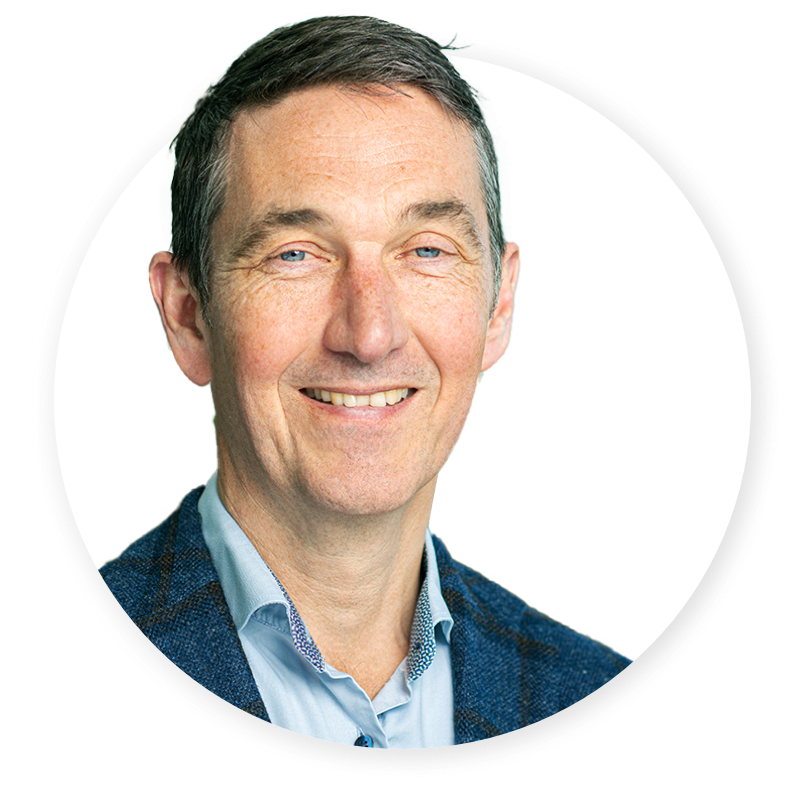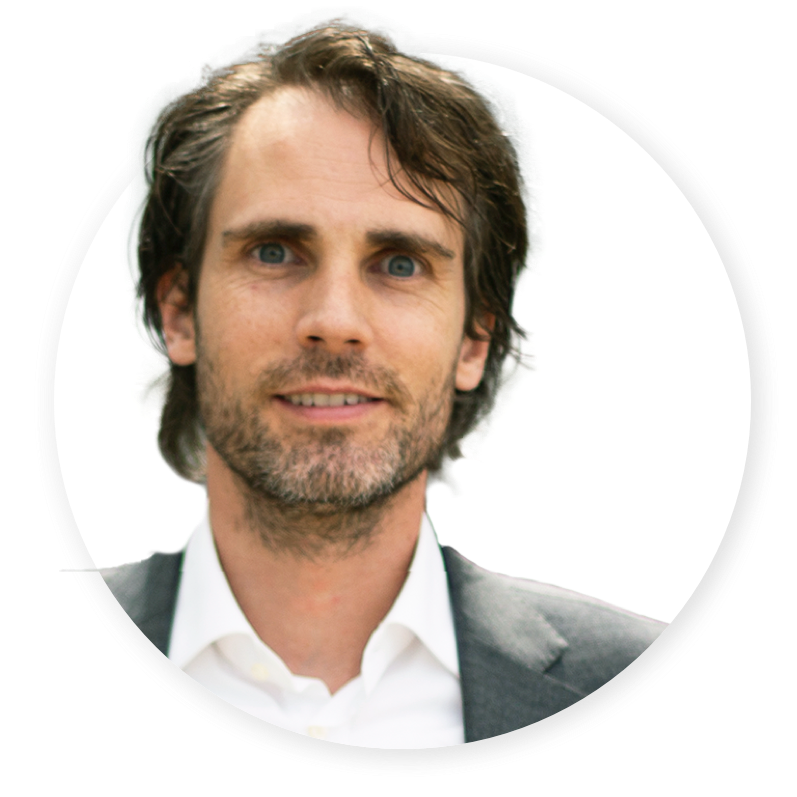Our progress
As our four-year strategy cycle drew to a close in 2023, Emeric van Waes passed over the Chief Strategy Officer reins to Peter Sanders. The two strategists reflect on our progress to date and the opportunities ahead.

Emeric van Waes
Former Corporate Strategy Officer
Emeric van Waes: ‘The final year of the strategy, from June 2022 to May 2023, was very challenging. The continuing war in Ukraine, the geopolitical tensions, rising energy prices and inflation brought uncertainty and volatility at all levels - political, economic and social. We saw this reflected in our markets too.
The Future of Energy, Food and Financial health are very relevant topics that we were investing in long before the Ukraine war started. It gained us a solid position with evidence- and fact-based content to help our clients explore possible scenarios going forward. So, while it was a difficult year, I also look back with pride that we came prepared for the situation based on the choices we made four years ago.’
What achievements are you most proud of over the four-year strategy cycle?
‘There has been significant acceleration in the Future of Energy. Starting with small projects in the Netherlands three years ago, there’s now real demand in many countries around the world. We’ve built a centre of competence for Carbon Emission Reduction and Hydrogen in the Netherlands, which now supports our broader European and global practice. We’re seeing a lot of activity, not only in Europe but also in the Middle East, and we’re also working closely with the World Economic Forum on this topic.
I’m also very proud of how our Public Sector practice has evolved over the past four years and certainly in the past year. We’re now helping NATO and the Ministry of Defence to improving their operability in order to work more efficiently together in military operations. We are partnering with the municipality of Rotterdam to lead them become an insights and AI-driven organisation to improve safety en equality for people in Rotterdam.’
Where do we stand on achieving our strategic imperatives?
‘If I think about the last year, I think our 'embrace purpose' pillar is really pulling ahead. The investments, for example around sustainability and ESG advisory, and choices we made four years ago are really becoming visible and accelerating. For example, through our Future of Food dining to net positive movement, the Financial Health coalition and collaboration with SchuldenLabNL, and the focus on inclusive society, sustainability and WorldClass of our Deloitte Impact Foundation projects. I think this is where we’ve made the biggest difference.
On market leadership, again we pulled ahead of the other Big 4. There’s been a real step change in our market visibility, our relationships with key stakeholders, and our broader presence in these important ecosystems compared to four years ago. The Public Sector, for example, has been one of those key areas.
Looking at our profitable growth imperative, we’ve grown significantly since 2019 both in terms of absolute revenue and profitability. The past year was challenging due to the market uncertainty on the one hand and the fact that we invested more in growth than in profitability on the other. But the long-term view shows a significant change from four years ago.
We made good progress on our innovation pillar but halfway into the strategy cycle we decided to take a more global perspective to strengthen both investments and scalability. This international collaboration led to the development of a software asset, Converge, for financial services organisations which is now a lighthouse example supporting transaction monitoring in the Netherlands. We started developing that asset in the Netherlands and we pooled our resources with the US and other member firms to put much more weight behind it.
We’ve made really big steps on inclusion and diversity in the people pillar compared to four years ago, with a more holistic approach looking at diversity from a much broader perspective including cultural background, neurodiversity, gender, LGBTQ+ and personalities. At the same time, I believe we can still make significant improvements, and this includes our male-female diversity ratios, where we need a more solid pipeline of future leaders to be able to reach a 50-50 target.’
What are you most proud of personally?
‘We really put purpose at the heart of our strategy and the core of our business. I strongly believe it was the right choice because despite two-and-a-half years of COVID-19, we were still able to get to where we wanted to be, not only from a financial perspective but especially from the perspective of our purpose, our people and our micro-leadership. That’s something I’m really proud of. In an increasingly uncertain world, we can really benefit from a strong moral compass to provide guidance on the choices we have to make.
And a final question to Emeric: What advice would you give to your successor? ‘The internationalisation of how we work is a key change ahead. Moving from a federated firm that collaborates quite well across borders to a more integrated firm that really collaborates seamlessly across borders. And also, to have fun and enjoy the ride. I certainly did!’
What does the strategy development process look like?
‘Purpose will still be at the heart of the strategy moving forward,’ confirms Peter Sanders, who is responsible for developing the strategy for Deloitte in the Netherlands for the next four years. We believe we have made the right choices, so instead of taking a completely different strategic direction, we are building on the current strategy. ‘With my team I’m revisiting the current strategy to make it fit for the future, incorporating the impacts of some major changes in our context in the past five years, such as the increasing market competition, technological developments and the accelerated international integration of our member firms. We want to bring those into the strategy in a smart way.
As in the previous strategy cycle, the strategy is being developed in a process of co-creation, listening to different voices from inside and outside the organisation. We believe that this process leads to even more commitment on the part of the partners and the leaders of Deloitte to the strategy and to our purpose.

Peter Sanders
Corporate Strategy Officer
Of course, we’re talking to the Executive Board and Executive Committee since they’re responsible for strategy execution with the partners in the Dutch firm. But we are also giving a prominent platform to younger talents, senior managers and purpose champions, people who inject and infuse fresh ideas on new topics - who may be the future leaders who drive the strategy trajectory forward.’
‘Naturally, we’re also introducing external perspectives, through extensive input from clients and rigorous fact-based analyses of market trends and our competitive environment. We expect to roll out our new strategy from the end of September 2023 onwards.’
Will this be a new strategy?
‘I prefer to call it a sharpened strategic plan to make us more future proof. Moving forward we’re introducing two new concepts. Firstly, to be more explicit about the “strong beliefs” underpinning the sharpened strategy. Secondly, we’re identifying the “big shifts” which we see as the signposts to the future.’
Many of the beliefs we held four years ago still hold true. Now we’re being more explicit about their interpretation. One of our strong beliefs is to be a purpose-led organisation, which is more important now than ever because it is going to be crucial to the way we serve our clients, the kinds of topics we can help them with, and how they view us. It’s also vital to ensure that talents want to work for Deloitte. Having said that, we also believe we can do an even better job of concentrating our efforts to be purpose-led, channelling and mobilizing them to make an even greater impact.
One of the “big shifts” that we’re seeing is increasing internationalisation, as Emeric already mentioned. Until recently, we primarily focussed on the Dutch market for growth. We now see opportunities to broaden our horizon to the rest of Europe, in collaboration with other NSE member firms.
Another “big shift” is to increase the use of global shared delivery centres, where we can complement our teams and deliver services to clients in the Netherlands more efficiently. We see opportunities to bring our capabilities to clients outside the Netherlands and benefit from our global delivery capabilities in the Dutch marketplace. It works both ways. I think it’s also going to be a lot of fun, collaborating with different cultures and nationalities, and creating an even bigger platform for our talent.’